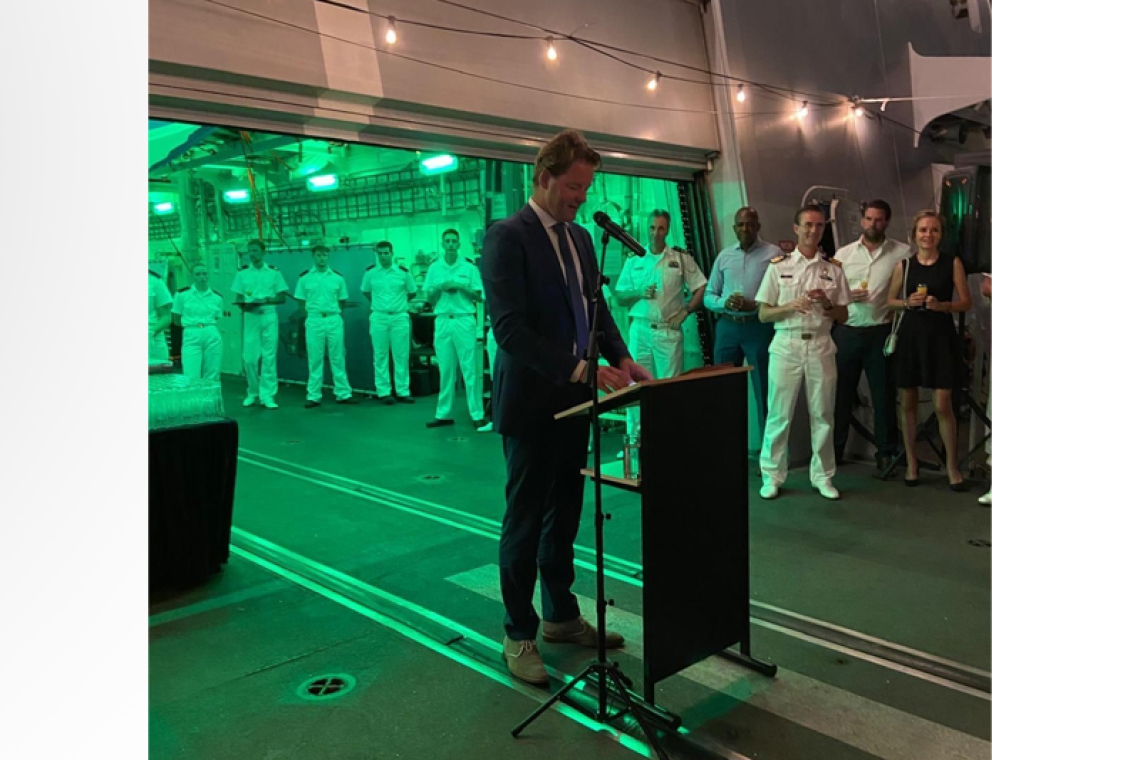During the reception on Dutch Navy ship “HNLMS Tromp” in Willemstad, Dutch Secretary General Maarten Schurink addressed the crew and guests.
THE HAGUE--Last week, representatives from the Dutch Ministry of Defence, including Secretary General Maarten Schurink and Commander of the Royal Netherlands Marechaussee KMar, Lieutenant General Annelore Roelofs, paid a working visit to St. Maarten, Saba, St. Eustatius and Curaçao. In a recent post on LinkedIn, Schurink wrote about his experience and the main threats to the islands’ defence departments: staff shortages and geopolitical tensions.
“Defence is a kingdom department. This means that as the ministry in the Netherlands, we also take on the defence of the other countries in the kingdom (Curaçao, Aruba, St. Maarten),” he wrote. That is why the representatives visited St. Maarten, Saba, St. Eustatius and Curaçao.
On St. Maarten, Saba and St. Eustatius, the delegation learned how the Department of Defence, together with civilian partners, is preparing for the hurricane season. “After Irma caused a lot of damage, all the plans are now super tight. With Ernesto a few weeks ago, that already came in handy. Hurricane preparedness is certainly not the only task of defence here. The Marines, with support from the local police and other units from the ABC Islands [Aruba, Bonaire, and Curaçao – Ed.], have helped the government restore calm to St. Maarten.” In St. Maarten, Schurink and colleagues discussed hurricanes and a number of other issues with Governor Ajamu Baly and the newly re-elected Prime Minister Dr. Luc Mercelina.
“We also spoke to many KMar colleagues. on the air and sea ports of Saba and St. Eustatius. Colleagues posted in the Caribbean Netherlands for Dutch border control. Where capacity is limited. We discussed that with Island Governor of Saba, Jonathan Johnson, and acting Island Governor of St. Eustatius, Sharon Hassell,” Schurink continued.
The delegation also spoke with colleagues who are supporting the countries in strengthening their border control. According to the secretary-general, the countries, and certainly St. Maarten, are facing significant shortages of capacity in their security forces. This leads to the KMar taking over many tasks there, he added.
On Curaçao, the representatives visited the KMar brigade, with whom they reflected on the tragic death of colleague Toon Brood, who was killed in a robbery this summer. “This has had a great impact on colleagues. They have set up a memorial near the canteen at the Suffisant Naval Barracks. Every time someone walks by and thinks of Toon they put a stone there – touching.”
In Curaçao, the delegation was briefed at the Naval Base Parera on preparations for the main defence task: the protection of the Kingdom’s territory in the Caribbean. “Geopolitical tensions are also a threat here. Plans are fast becoming as concrete as those in Europe, and that is much needed,” Schurink argues.
Schurink also spoke to administrators in Curaçao such as Governor Lucille Andrea George-Wout and Dutch Representative Edson Hato about the (geo)political situation.
The trip ended in a memorable way: with the final call of Dutch Navy ship “HNLMS Tromp” in Curaçao. “I won't soon forget the finale of this visit: the entry with gun salutes of ‘HNLMS Tromp’ in Willemstad, after a six-month world voyage. Very special that the ship’s last stop is a port call in Willemstad, in its own Kingdom. During the reception I addressed the crew and guests. The voyage of the ‘HNLMS Tromp’ is much more than a world tour of 200 men, the voyage stands for a strong Kingdom of the Netherlands, a Kingdom that shows that it wants to protect what is dear to us. To the crew of ‘HNLMS Tromp’, I would like to say for the journey home in a week’s time: have a safe trip!” Schurink concluded.







